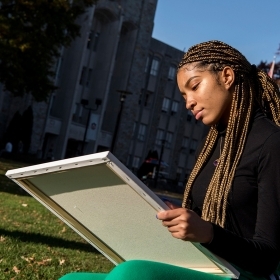College Rankings Are Useful. Campus Culture Is Essential.

Rankings only tell you so much. Campus culture shapes your college experience. Learn how to find your fit and see how St. John’s University in Queens, NY, gets it right.
When you’re researching colleges, there’s much to think about: majors, location, cost, class sizes, academics (and the list goes on). But there’s one factor that can make or break your college experience, and it’s something you can’t easily measure in a ranking or brochure. That factor is the school’s overall campus atmosphere and student culture.
Campus culture is all about what life actually feels like once you’re there. It’s the personality of a school, the campus vibe, the way students connect with each other, and the values that shape everything from student clubs to campus events.
Finding a school with the right cultural fit is about more than just having fun—it’s about finding a place where you feel comfortable, supported, and inspired to get involved. After all, you’re not just picking a school; you’re choosing a college community to be part of for the next four years (and likely long after that).
What Exactly Is Campus Culture?
If you’ve ever visited a school and thought, “This feels like my kind of place,” you’ve already experienced the campus vibe in action. This isn’t one single factor; it’s a combination of things, like:
- Who goes there: Is the student body diverse? Do students seem collaborative or competitive?
- What the school values: Does the college emphasize service, school spirit, research, or something else?
- How students spend their time: Are student government and service projects popular? Do students stick around for weekend events, or is it more of a commuter school?
- Signature traditions: From campus festivals to service days, campus traditions and events show you what brings students together—and what the school truly values.
Campus culture shapes how you’ll experience daily life at college. It influences who you meet, what opportunities come your way, and how supported you feel when things get challenging.
Start with the Basics, Then Look Deeper
Before you start analyzing culture, make sure you know the basics of what you need in a school. This is where using a college search checklist can help you prioritize:

Academics
Does the college have strong programs in your areas of interest?

Location and Size
Close to home or far away? Urban campus or small town? Do you want a smaller campus where you’ll see familiar faces daily, or a larger university with thousands of students?

Cost
What’s your budget, and what kind of financial aid does the school offer?
How to Understand a School’s Culture (Even if You Can’t Visit)
While culture may be harder to research than things like tuition or class sizes, it’s not impossible. Here are some ways you can get a sneak peek into what a college’s campus culture is really like.
Explore Student-Run Social Media
Check out TikTok, Instagram, and YouTube for student-created content like dorm tours, day-in-the-life videos, and event recaps. This is a window into authentic student life on campus.
Attend a Campus Tour In-Person or Virtually.
Tours give you more than a look at the buildings. They’re a chance to observe interactions and ask real questions to tour guides and current students. Use a list of questions to ask on a college tour, such as:
- What do students do on weekends?
- How easy is it to make friends?
- What surprised you most about the culture here?
Talk to Real Students
If you can, go beyond admission reps and connect with current students. Ask about their favorite traditions, and whether they feel supported by the school’s student support services.
Review Student Organizations and Groups
Most schools list their student organizations online. Look for clubs that reflect your interests or cultural background. Schools with active, diverse clubs often have a more inclusive and welcoming campus culture.
Get the Inside Scoop
Sites like Unigo, Niche, and CampusReel offer real student reviews, personal experiences, and video tours created by students themselves. These platforms can give you an unfiltered look at the good, the challenging, and the unexpected parts of life at different schools.
Finding Your Communities Within Campus Culture
For many students, campus culture isn’t just about the general atmosphere, it’s about whether you can find your people. College can feel more like home when you know there are spaces where you’ll be understood, supported, and celebrated. As you explore schools, it’s worth looking into communities for students who might share your background, passions, or identity, such as:
Religious and faith-based communities: Whether you’re looking for religious student groups, or interfaith gatherings, knowing what spiritual life looks like can help you feel more at home.
First-generation students: Some colleges have special mentoring programs, advising networks, or living-learning communities designed to help first-gen students succeed.
LGBTQIA+ students: Are there pride groups, gender-inclusive housing options, or a dedicated resource center?
Students of color: Many schools have cultural centers, affinity groups, or multicultural student unions where students come together for celebration, advocacy, and support.
Women in science, technology, engineering, and mathematics (STEM) and other underrepresented groups: If you’re entering a field where your identity is underrepresented, it’s worth asking if there are mentoring programs, networking opportunities, or supportive student organizations.
Veteran and military-affiliated students: For veterans or military family members, schools with dedicated support offices and peer groups can make the transition to college life smoother.
Neurodivergent students and students with disabilities: Beyond academic accommodations, some campuses offer peer support groups, sensory-friendly spaces, or student-led advocacy organizations.
Even if you don’t join every group that fits your background, knowing they exist creates a sense of possibility and comfort, knowing that you can find your community when you need it.
What Makes St. John’s University’s Culture Unique
At St. John’s University, the culture is built around service, diversity, and community. This creates an environment where students not only excel academically but also grow as compassionate, purpose-driven leaders. St. John’s is located in a global, metropolitan city but offers a friendly residential suburban campus environment with access to internal locations.
St. John’s embraces diversity that shapes classroom conversations, student organizations, and events. Students are constantly learning from peers whose backgrounds and experiences differ from their own.
The University’s Catholic and Vincentian mission also plays a key role in shaping culture. Service isn’t just encouraged, it's embedded into student life. From campus-wide Service Days to global service trips, students connect their education to real-world impact.
That sense of community also extends to student support services. From personalized academic advising to wellness programs and career coaching, St. John’s invests heavily in student success, not just academically, but holistically.
And, of course, there are the campus traditions that bring everyone together. From the high-energy Red Storm Tip-Off, to Senior Week, to cultural heritage celebrations, these events foster belonging and school pride.
Curious to see if St. John’s could be the right fit for you?
Schedule a visit to experience the campus atmosphere firsthand.






